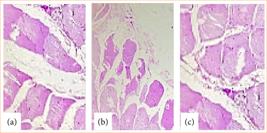ABSTRACT
Purpose: To evaluate intravenous meropenem and intraperitoneal 10% aqueous extract of Schinus terebinthifolius (aroeira) in elderly rats after autogenous fecal peritonitis.
Methods: Thirty 18-month-old Wistar rats underwent peritonitis with 4 mL/kg of autogenous fecal solution. They were stratified into groups: control without treatment; study I, treated with meropenem (40 mg/kg); and study II, treated with meropenem at the same dose and intraperitoneal 10% aqueous extract of aroeira. The animals were monitored for 15 days until euthanasia. The study was approved by Ethics Committee.
Results: There was no significant weight loss in the study-II group (p = 0.6277), while the study-I group showed partially recovered weight (p = 0.0187). The study-II group had 90% negative blood cultures, while the study-I group had in 50% of the animals (p = 0.1479). Survival in the study-II group was higher than in study-I group (p = 0.0462). The morbidity score for abdominal and thoracic cavity was lower in the study-II group as compared with study-I group (p = 0.0001).
Conclusions: The use of meropenem associated with the intraperitoneal 10% aqueous aroeira extract after induction of autogenous fecal peritonitis in elderly rats produced greater survival, less weight loss, and lower morbidity compared to the use of meropenem alone.
Key words
Peritonitis; Aged; Carbapenems; Rats; Anacardiaceae

 Intravenous meropenem and intraperitoneal use of 10% aqueous extract of Schinus terebinthifolius Raddi (Anacardiaceae) in elderly rats after induction of autogenous fecal peritonitis
Intravenous meropenem and intraperitoneal use of 10% aqueous extract of Schinus terebinthifolius Raddi (Anacardiaceae) in elderly rats after induction of autogenous fecal peritonitis Thumbnail
Thumbnail
 Thumbnail
Thumbnail
 Thumbnail
Thumbnail
 Thumbnail
Thumbnail
 Thumbnail
Thumbnail
 Thumbnail
Thumbnail
 Thumbnail
Thumbnail
 Thumbnail
Thumbnail
 Thumbnail
Thumbnail
 Source: Elaborated by the authors.
Source: Elaborated by the authors.
 Source: Elaborated by the authors.
Source: Elaborated by the authors.
 Source: Elaborated by the authors.
Source: Elaborated by the authors.
 Source: Elaborated by the authors.
Source: Elaborated by the authors.
 Source: Elaborated by the authors.
Source: Elaborated by the authors.
 Source: Elaborated by the authors.
Source: Elaborated by the authors.
 Source: Elaborated by the authors.
Source: Elaborated by the authors.
 Source: Elaborated by the authors.
Source: Elaborated by the authors.
 Source: Elaborated by the authors.
Source: Elaborated by the authors.